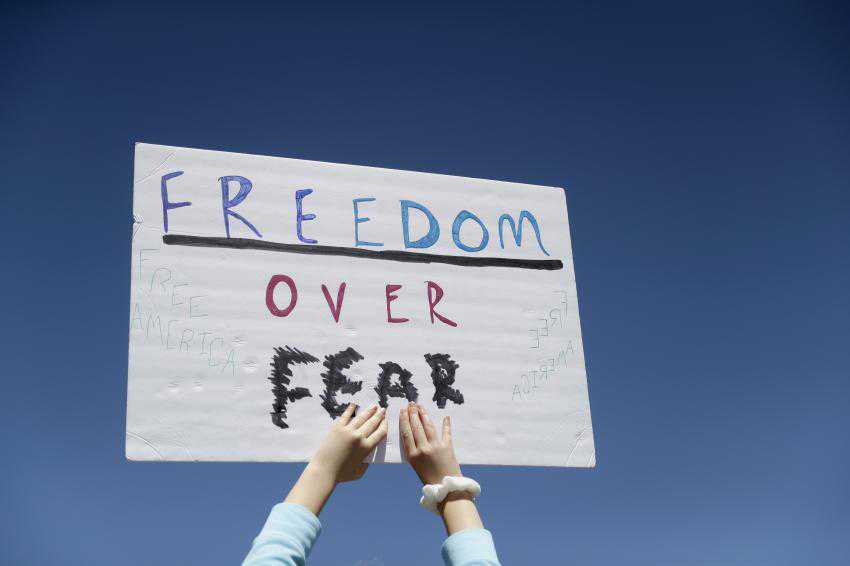Few US citizens support easing virus protections: poll
23 April, 2020

Americans remain overwhelmingly in favor of stay-at-house orders and other work to slow the pass on of the coronavirus, a new survey finds, even while compact pockets of attention-grabbing protests demanding the lifting of such constraints emerge nationwide.
The study from The Associated Press-NORC Center for Public Affairs Exploration also finds that a most Americans say it won’t be safe to lift up social distancing guidelines any moment in the future, running counter to the decision of a small number of governors who've announced plans to help ease within days the public health efforts that have upended lifestyle and roiled the global economy.
More than a month after schoolyards fell silent, cafe tables and stools emptied, and waves from a safe and sound length replaced hugs and handshakes, the country largely believes restrictions on social interaction to curb the spread of the virus work.
Simply 12% of Americans say the measures where they live go too much. About doubly many persons, 26%, believe the restrictions don’t go far plenty of. The majority of Us citizens - 61% - feel the measures taken by authorities officials to prevent infections of COVID-19 within their area are about right.
About 8 in 10 Americans say they support measures that include requiring Americans in which to stay their homes and limiting gatherings to 10 persons or fewer - numbers that contain generally held steady in the last few weeks.
“We haven’t begun to flatten the curve yet. We’re even now ramping up in the number of cases and the amount of deaths,” stated Laura McCullough, 47, a college or university physics professor from Menomonie, Wisconsin. “We’re still learning about what it can carry out, and if we’re still studying what it could do, this isn’t likely to be enough time to let persons go out and make contact with their life.”
As the poll reveals that the thoughts behind the protests that materialized during the past about a week in battleground states such as for example Michigan, Ohio, Pennsylvania and Wisconsin are held by only a tiny fraction of Americans, it does get signs that Republicans are, like President Donald Trump, becoming more bullish on reopening aspects of public life.
Simply 36% of Republicans right now say they strongly favor requiring Americans to remain home through the outbreak, weighed against 51% who said hence in later March. While majorities of Democrats and Republicans believe current restrictions their current address are about right, Republicans are roughly four times as very likely as Democrats to think restrictions set up go too much - 22% to 5%.
More Democrats than Republicans, meanwhile, think restrictions don’t go much enough, 33% to 19%.
“They’ll be lifted, but you may still find going to be sick people playing around,” said 66-year-old Lynn Sanchez, a Democrat and retired ease shop manager from Jacksonville, Texas, where Gov. Greg Abbott has got reopened status parks and plans to announce additional relaxations in a few days. “And we’re going to have another pandemic.”
A lot more than 45,000 people in america have died from COVID-19, while 22 million have requested unemployment rewards since March. It’s that monetary cost that has led some governors to follow Trump’s lead and start talking about making it possible for some shuttered businesses to reopen, including in Georgia, where various businesses - incorporating gyms, bowling alleys and tattoo parlors - can carry out so starting Friday. Eating places there can resume dine-in service in a few days.
The survey finds that few Americans - 16% - think it’s very or extremely most likely that their areas will become safe enough in a few weeks for the constraints to come to be lifted. While 27% believe it’s somewhat likely, most Americans - 56% - say circumstances are unlikely to get safe in a couple weeks to begin lifting the current restrictions.
“If we try too much to restart the market prematurely, you will have waves of reinfection,” said 70-year-old retired medical equipment salesman Goble Floyd, of Bonita Springs, Florida. “I don’t think the market or life are certain to get back to common until there’s a vaccine. It just appears this is so seriously contagious.”
The emerging partisan distinctions are apparent. Georgia Gov. Brian Kemp is a Republican and unwavering Trump supporter. GOP lawmakers in Wisconsin filed go well with Tuesday against the state’s Democratic governor after he purchased most nonessential businesses to stay closed until May 26.
The poll finds 59% of Republicans say it’s at least somewhat likely that their areas will be safe enough for reopening in simply a few weeks, weighed against 71% of Democrats who say it is unlikely. Still, possibly among Republicans, just 27% say that’s more than likely.
“We haven’t met one individual at the protests that disagrees with the fact that we must self-quarantine until April 30,” explained Matt Seely, a good spokesman for the Michigan Conservative Coalition, which sponsored an automobile-based protest at the state’s capitol found in Lansing last week. “Nobody really wants to do the incorrect thing. However the solution is certainly not to stay in your home before last circumstance of COVID is fully gone.”
Beaumont reported from Des Moines, Iowa.
The AP-NORC poll of just one 1,057 adults was conducted April 16-20 by using a sample drawn from NORC’s probability-based AmeriSpeak Panel, which was created to be representative of the U.S. people. The margin of sampling error for all respondents is normally plus or minus 4.0 percentage tips. Respondents were 1st selected randomly employing address-based sampling strategies and soon after were interviewed on-line or by phone.
Source: japantoday.com
TAG(s):
